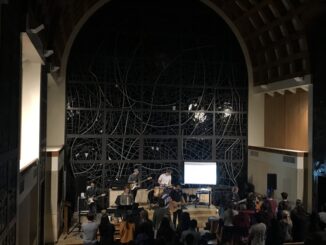
Is music getting better or worse?
The answer might not be as simple as one would think.
A Pepp Post poll of 62 people found the results split. Half said music continues to improve, and the other half said music is going downhill.
While most students listen to the music of the moment, some 26% prefer music from previous decades.
Tory Wile, a junior history major and music minor, said today’s artists are making music through a new lens, making it hard to tell if it is improving or getting worse.
“I think the thought behind music sometimes might get lost by the need to make it usable on a platform where just 10-20 seconds are used,” Wile said. “This isn’t all bad because it is now easier for people to get the recognition they deserve.”
Social media and streaming have made this generation’s music more accessible, improving the industry’s business.
Students debate a difficult question
The poll found that when people are alone, just over half prefer listening to music from older decades. However, when around others, more than half choose current mainstream music.
Many people have a range of artists they listen to alone versus socially, including Jonie Mitchell, John Coltrane, The Beatles, The Smiths, Jesse Saunders, WILLOW, Kendrick Lamar, YEBBA, Dominic Fike, Tame Impala, Taylor Swift and TV Girl.
More than half of polled people said the sound draws them to older music, followed by just under half saying originality.
Social media’s impact on popular music
Junior psychology major Peter Runey said music is moving away from its original goal due to social media.
“Social media has reoriented [music] toward instant gratification and what hook or bridge or chorus can be the catchiest or synchronized to a dance move, which is never how music was supposed to be composed,” Runey said. “It has kind of cheapened the process of listening and creating.”
Others agreed that the fast-paced turnout of music is what turns them away from mainstream music.
“I think it’s gotten more saturated,” junior art major Inara Ali said. “Music moves a lot more quickly, whereas, on the radio, you hear a song for six months and are stuck with it.”
Many were quick to point out social media’s negative effects on the music industry, yet there are also important positives to note.
LaMarcus Miller, professor of voice and music business at Berklee College of Music, said that although social media and streaming have negatively impacted music, music is at a peak for creativity.
“This is the most creative, innovative, exciting time,” Miller said. “I think music is the most powerful, right now, as it has ever been.”
Miller said artists make music for deeper reasons and are more strategic, such as writing anthems for political figures.
The spread of music through social media allows the audience to find new artists, compared to past decades when it took more work for musicians to be discovered.
“I think we should go into social media being the person to discover,” Wile said. “Put on your record label goggles and pretend you’re going to sign someone.”
What draws people to older music
Whether it’s honesty, simplicity, or plain old nostalgia, people strongly desire to connect with past generations’ cultures through music. Many argue that more mainstream music lacks these aspects.
Studies have looked at trends in popular music. Callum Davies wrote in a 2022 Marketing Letters journal that most people peak in their preference for popular music around the age of 23.5. The study found that the songs that are on the Billboard Top 10 charts when people are coming of age become their “song-specific age,” contributing to the peak in popular music enjoyment for the average person.
Many said nostalgia is a big reason they like older music.
“I like these songs because I grew up listening to them,” Ali said. “I’m not sure if I would like them as much if they came out today.”
KC Anderson, assistant to the associate dean for Curriculum and General Education, said she is drawn to the historical element of older music.
“For me, it’s the history,” Anderson said. “It’s wondering what was going on to cause them to write with no cohesive sense.”
Music allows younger generations to dive into the past worldwide and understand what might have happened in that period. It also allows listeners to step out of what is currently happening in the world around them.
“You either listen to older music because you find something relatable about it,” Runey said. “You don’t relate to the current space of art and humanity right now, so you’re trying to find something that actually resonates with you.”
Is music getting better or worse?
Considering all of these factors, the question now becomes whether people think music is improving or going downhill.
Many people recognize that both may be true at the same time — some aspects of music today are improving, and some are declining.
“Music is this living, breathing thing,” Miller said. “It’s like Boston weather. If you don’t like it, it will change in the next few years or the next moment.”
Others agreed that parts are getting better or worse but still find it hard to give one answer.
“There are elements that are getting better,” Anderson said. “There are certain artists today who I don’t think are progressing music, but I don’t think anyone could say one way or another.”
Annie Filback reported this enterprise story in Jour 241 during the Fall 2024 semester under the supervision of Dr. Christina Littlefield and Dr. Theresa de los Santos. Dr. Littlefield supervised the web article.




